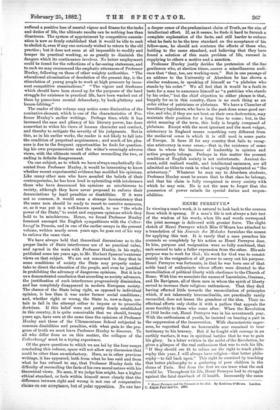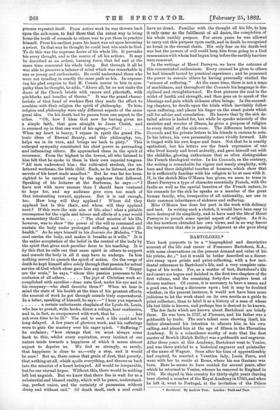HENRI PERREYVE.*
IN viewing a man's work, it is natural to look back to the sources from which it sprang. If a man's life is not always a fair test of the wisdom of his words, when life and words correspond the joint message is delivered with greater force. The slight sketch of Henri Perreyve which Miss O'Meara has attached to- e, translation of his Journee des 3falad,es furnishes the means for applying this test. It is rarely that a man preaches his counsels so completely by his action as Henri Perreyve does- In him, purpose and resignation were so fully combined, that each seemed to take a fuller expression from the other. His sole purpose was to work for God ; his work for God was to consist mainly in the resignation of all power to carry out his purpose.. Henri Perreyve was fortunate, in that he was born one of that noble band of enthusiasts whose efforts were directed to the reconciliation of political liberty with obedience to the Church of Rome. With him we associate the names of Lacordaire, Ozanam, and De Ravignan, all of them men in whom the spirit of liberty served to increase their religious enthusiasm. That they died having effected little towards the reconciliation of principles which, if not inherently irreconcileable, are practically rarely reconciled, does not lessen the grandeur of the idea. Their in- effectual efforts only clothe it with a pathos that appeals the more forcibly to those who come after. When the Revolution of 1848 broke out, Henri Perreyve was in his seventeenth year.. With the enthusiasm of youth, he insisted on bearing a part in the suppression of the insurrection. With characteristic eager- ness, be regretted that no honourable scar remained to bear testimony to his bravery. But if he fought with courage in an earthly warfare, it was in spiritual battles that he was to gain his glory. In a letter written in the midst of the Revolution, he gives a glimpse of the real enthusiasm that was•to rule his life. " If they should see fit to refuse me the right to teach philo- sophy this year, I will always have religion—that better philo- sophy—to fall back upon." This right he exercised by teaching that better philosophy to a gathering of poor children in the slums of Paris. But from the first we can trace what the end would be. Throughout his life, Henri Perreyve had to struggle against the fatal drawback of ill health. Incessantly the same • Henri Pamirs and hie Counsels to the Sick. By KatWeen O'Meara. London C. Kogan Paul mad Co, 11382. process repeated itself. From active work he was thrown back upon the sick-room, to find there that the surest way to bring home the truth of counsels to others was to pat them in practice himself. From his earliest years his heart was set upon becoming a priest. In that way he thought he could best win souls to God. To do this was the supreme desire of his whole life. It pervades his every thought, and is the source of all his actions. It may be described as an ardent, burning force, that fed and at the same time consumed his whole being. But through it all he was able to preserve a balance of mind which was remarkable in one so young and enthusiastic. He could understand those who were not treading in exactly the same path as his. In express- ing his glad surprise to find M. Cousin nearer to him in sym- pathy than he thought, he adds, "Above all, get us not make the doors of the Church bristle with razors and pikestaffs, with pitchforks and bundles of thorns." It was the grand charac- teristic of that band of workers fhat they made the effort to combine with their religion the spirit of philosophy. To him, religion and philosophy were only different aspects of the same great idea. On his death-bed he passes from one aspect to the other. " Oh, how I bless God now for having given me a simple faith, that goes straight to Jesus Christ, and is summed up in that one word of his agony,—Fiat! When my heart is heavy, I repass in spirit the grand Pla- tonic ideas of Eternal Beauty, and this philosophy, too, helps me in its turn, and brings me back to piety." This enlarged sympathy constituted his chief power in persuading and influencing others. He approached them in the spirit of reverence. From the highest to the lowest, all who listened to him felt that he spoke to them in their own especial tongues. ." All men understood him ; the cultivated student, the un- lettered workman, the little child. Each, as he listened, saw the secrets of his heart made manifest." But he was far too keen- sighted to be carried away by the applause that followed. Speaking of his lectures at the Sorbonne, he says :—" I have met with more success than I should have ventured to hope for, and my audience give even too much of that intoxicating reward, applause. But it is sad enough, too. How long will they applaud ? Whom did they applaud last in this chair, and whom will they applaud next P If this were the sole aim of life, alas ! what a pitiable recompense for the vigils and labour and efforts of a year would a momentary thrill be " The chief mission of his life, however, was to show " the power of the will to command and sustain the body under prolonged suffering and chronic ill- health." As he says himself in his ,Tournie des Malades," The soul carries the body, and makes it breathe as it wills." It is the entire acceptation of the belief in the control of the body by the spirit that gives such peculiar force to his teaching. It is by this that he calls out that same spirit in others to support and console the body in all it may have to undergo. In him nothing served to quench the spirit of action. On the verge of death he kept himself alive solely through that passion for actual .service of. God which alone gave him any satisfaction. "Happy are the souls," he says," whom this passion possesses to the exelusion of all others The joys of Christian work ac- complished with sacrifice—done unto God, under his eye and in his company—who shall describe them P" When we bear in mind the state of his health at the time of his greatest efforts, the amount of work he got through sounds truly supernatural. In a letter, speaking of himself, he says :—" I hear you reproach
a certain unfortunate chaplain of the Lye& St. Louis, who has to preach, write books, direct a college, hear confession, and is, in fact, so overpowered with work, that he has not even time to be ill." The end to such a life could not be long delayed. A few years of glorious work, and his sufferings were to gain the mastery over his eager spirit. " Suffering !" Ire exclaims ; "how strange that we must always come back to this, whilst every aspiration, every instinct of our nature tends towards a happiness of which it seems almost unjust to deprive us. We feel so strongly, so surely, that happiness is close to us,—only a step, and it would be ours ! But no, there comes that grain of dust, that poverty, that nothing-at-all, which spoils everything, and throws us back into the miseries of a heart betrayed. All would be irreparable, but for our eternal hopes. Without this, there would be nothing left but anguish. But we know that there lies in wait for us a substantial and blessed reality, which will be peace, understand- ing, perfect union, and the certainty of possession without decay and without end." Of death itself, such a soul could
have no dread. Familiar with the thought all his life, to him it only came as the fulfilment of all desire, the completion of his whole earthly purpose. For seven years he was allowed to carry out this purpose upon earth, and in death he recognised no break in the eternal chain. His only fear on his death-bed was lest the powers of evil could keep him from going to a God communion with whom had begun long before the earthly barriers were removed.
In the writings of Henri Perreyve, we have the outcome of this concentrated enthusiasm. Every counsel he gives to others he had himself tested by practical experience ; and he possessed the power to console others by having personally studied the "science of suffering. " At the same time, there is not a trace of morbidness, and throughout the Counsels his language is dis- ciplined and straightforward. He first pictures the soul in the midst of health and strength, and then goes on to speak of the blessings and gain which sickness often brings. In the succeed- ing chapters, he dwells upon the trials which inevitably follow upon suffering, and places his finger on the exact points which call for advice and consolation. He knows that by the sick de- tailed advice is looked for, but while he speaks minutely of the anxieties and worries of illness, he gives a purpose of religion to every detail of the sick-room. The difference between his Counsels and his private letters to his friends is curious to note. In his letters, his own personality comes vividly forward. Life is tinged with his own hopes and fears. Not that he is exactly egotistical, but his letters are the frank expression of one who lived keenly and loved ardently, and gave himself out with the childlike, glowing enthusiasm that so often distinguishes the French theological writer. In his Counsels, on the contrary, the writing is remarkable for vigour and manly simplicity, with here and there delightful touches of humour, which show that he is sufficiently familiar with his religion to be at ease with it. If, in the sketch Miss O'Meara has given, we seem to trace in Henri Perreyve a type of character essentially French, with the faults as well as the special beauties of the French nature, in his counsels for the sick he speaks as a member of the great human family, who, irrespective of all nationality, are one in their common inheritance of sickness and suffering.
Miss O'Meara has done her part in the work with delicacy and tact. In writing such a sketch, it would have been easy to have destroyed its simplicity, and to have used the life of Henri Perreyve to preach some special aspect of religion. As it is, she has nowhere obtruded her own views, and in no way leaves the impression that she is passing judgment as she goes along



































 Previous page
Previous page